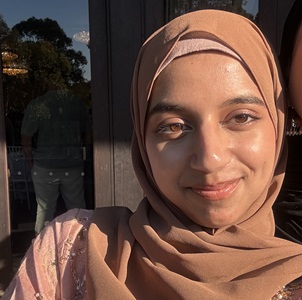
Eman Tahir
Rural Medical Scholarship 2025
Western Sydney University, NSW
Bathurst Clinical School
Scholarship Awarded 2025
Sponsored by:
Lechner Rural Medical Scholarship

How would the Australian Rotary Rural Health Scholarship help with my studies at the Rural Clinical School?
When I’m asked incredulously by my peers – “why Bathurst” – the answer is so multifaceted it’s hard to put it in one sentence. After just a few visits to Bathurst it was obvious that rural medicine had infinities of unique experiences and opportunities to offer. One particular interaction has really stuck with me since then – a little boy proudly showing me his surgical scars from his numerous dirt biking adventures, telling me all about his experiences in hospital and the surgeries he had done. What stood out to me the most from his stories and my conversations about health with every person I have met was the resilience and resourcefulness of every doctor, nurse, paramedic, physiotherapist and community member, and the unique way in which healthcare is a collective endeavour in every regard when you’re rural, despite the relative isolation and lack of access that challenges rural healthcare.
With these inspiring glimpses into rural medicine, it would be the greatest privilege to dedicate as much of myself as possible to the rural clinical school without the additional stress of working alongside university studies. From my research and discussions with clinicians and previous students at Bathurst Base Hospital, the relatively smaller patient load rurally means that it will be imperative to seek opportunities beyond what is required in a metropolitan setting. With an ARH scholarship, I know that I will have the time and energy to fully immerse myself in country life, and learn the skills and knowledge to contribute back to the rural community as a capable doctor. Aside from being able to spend as much time as possible in the hospital, it would also allow me to invest effort into my involvement with RHUWS and my position at the WSU Obstetrics and Gynaecology Society to gain a better understanding of how to tackle the adversities currently facing rural health, especially relating to women’s health and obstetrics. Furthermore, I would love the opportunity to participate in the wonderful events organised by the Bathurst Rotary Club and be more involved with the local community to learn about their perspectives and observations about healthcare. The advantages of practising medicine rurally are undeniable to me, and I have been considering undertaking post-graduate training at a rural hospital since first year. Being a scholarship recipient will allow me to demonstrate my dedication to rural health, and help to build the foundation for a career serving the communities that serve Australia most.
Current Progressive Report
When I think back on my year so far in Bathurst, it’s hard to imagine having done my clinical training anywhere else. Since January, I’ve completed my Paediatrics and Psychiatry rotations, with my Obstetrics and Gynaecology placement now drawing to a close. Not once have I felt regret for choosing to move here—in fact, hearing my Sydney colleagues’ stories of the same placements only confirms for me how invaluable a rural placement is for developing both clinical skills and professional confidence.
Living directly across the road from the hospital has been an incredible privilege, especially during O&G. At any hour, I can be on the wards within minutes—whether it’s to catch a late-night delivery, assist in theatre, or simply follow up with a patient. My aim on this rotation was to simulate what I imagine being a resident would be like, staying long hours and truly appreciating the demands, rewards, and privileges of obstetrics. This rotation in particular has cemented my passion for O&G, and I know the depth of patient involvement I’ve had here would have been impossible in a busier metropolitan setting. The smaller patient load, the tight-knit multidisciplinary teams, and the genuine investment of supervisors in student learning make rural medicine an unparalleled training experience.
On the occasions we aren’t spending time with our patients and staff on placement, it has been wonderful to explore Bathurst and its surrounding areas. Before moving here I had planned to really embrace the country lifestyle and all it has to offer. In keeping with this resolution in the last few months I have driven a tractor, been to a sheep farm and helped with vaccinations and castration, and have been taking horse riding lessons in Portland. With everything in town within a ten-minute drive, I’ve had more time for wellbeing— like going to ParkRun on Saturday mornings (and reversing it all by trying a new cafe after every run).
This year has also given me space to deepen my extracurricular involvement. I had the opportunity to help out at the first AIMA event in Bathurst, connecting with an inspiring network of doctors for mentorship and career guidance. With the Western Sydney Obstetrics and Gynaecology Society, I led our first in-person Birthing Kit Night, where students packed eighty clean birthing kits for mothers in need around the world. We have also run two mock OSCEs for our fourth-year cohort and are planning a careers night later in the year.
Reflecting on the year so far, I can say without a doubt that rural life has given me more than just clinical experience—it’s given me the time, headspace, and sense of community to grow into a better student, and hopefully a better doctor in the future. Every patient interaction, every conversation with a colleague, and every moment spent learning in Bathurst has reinforced my commitment to rural health and strengthened my resolve to pursue a career in obstetrics and gynaecology.